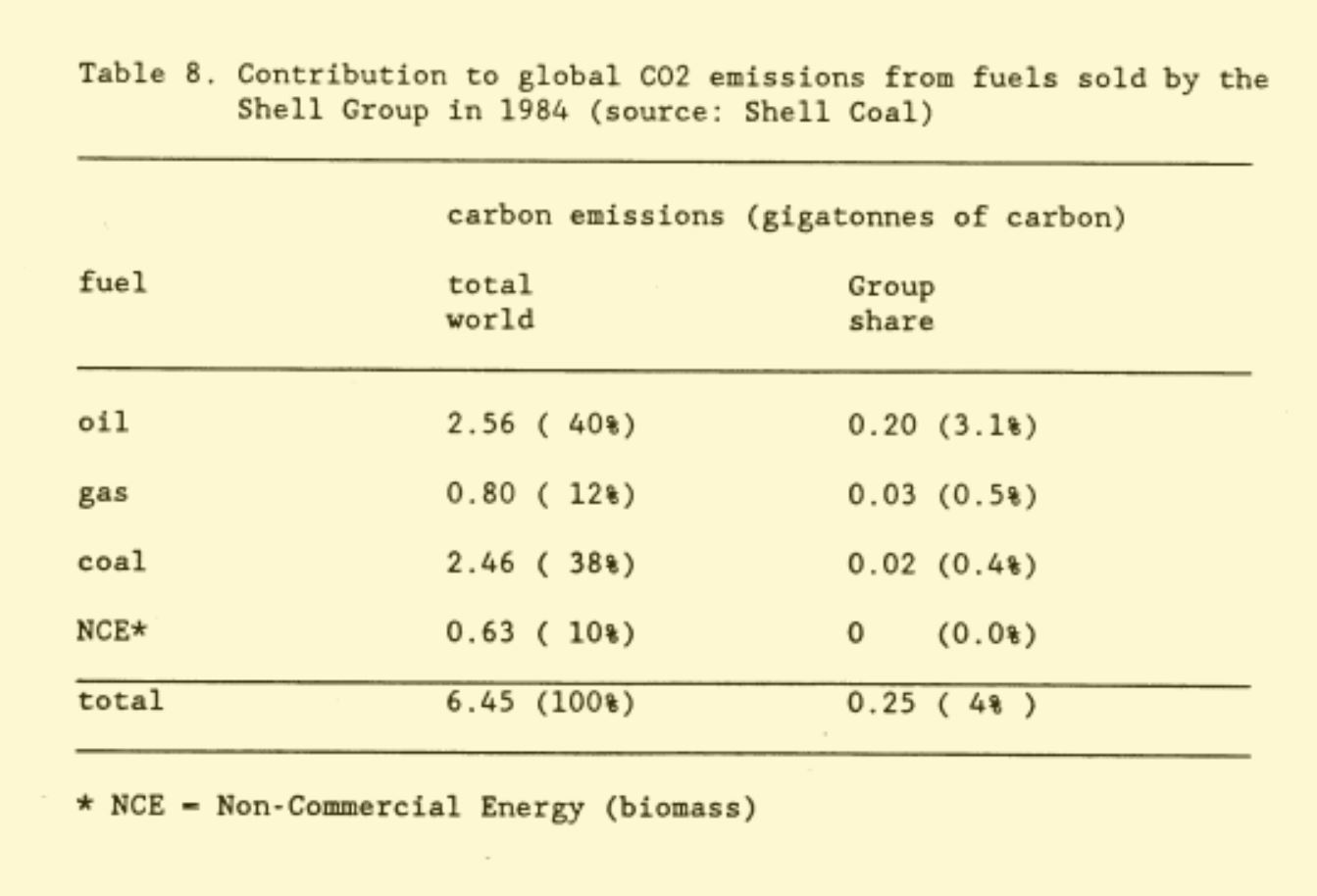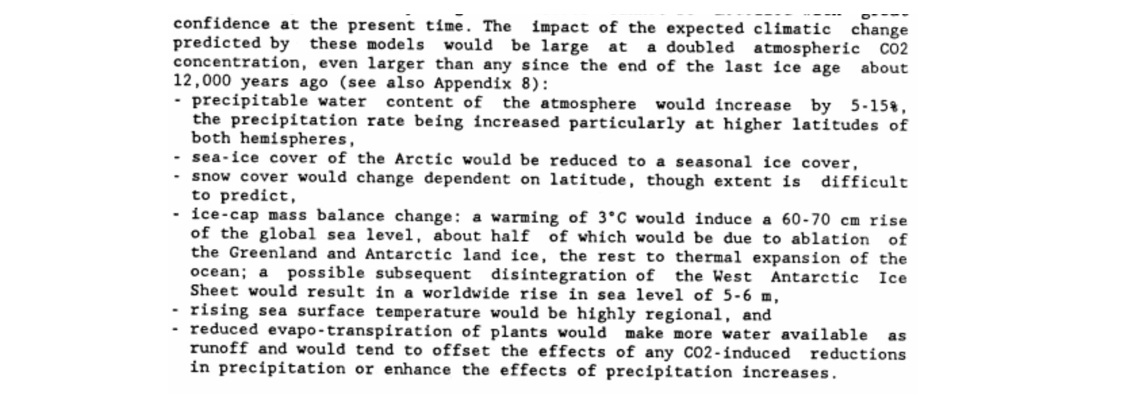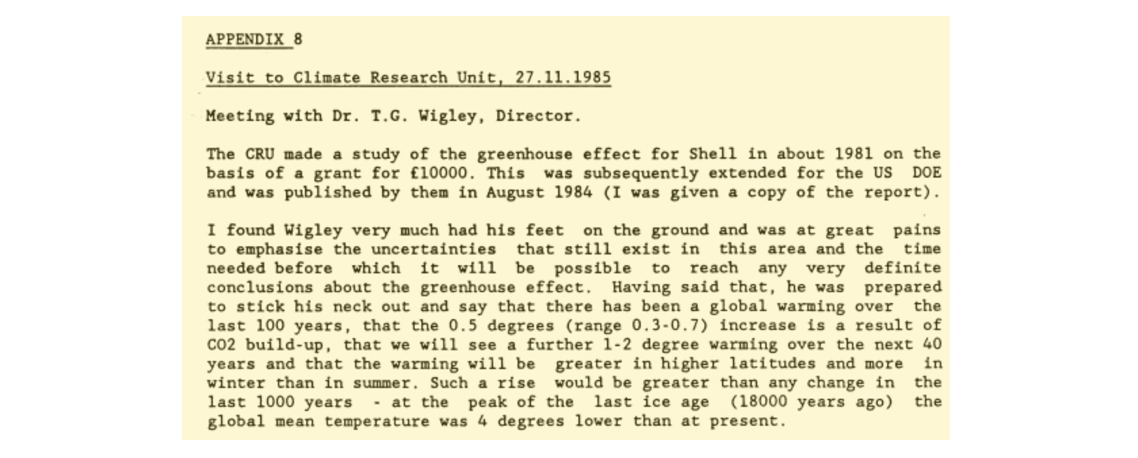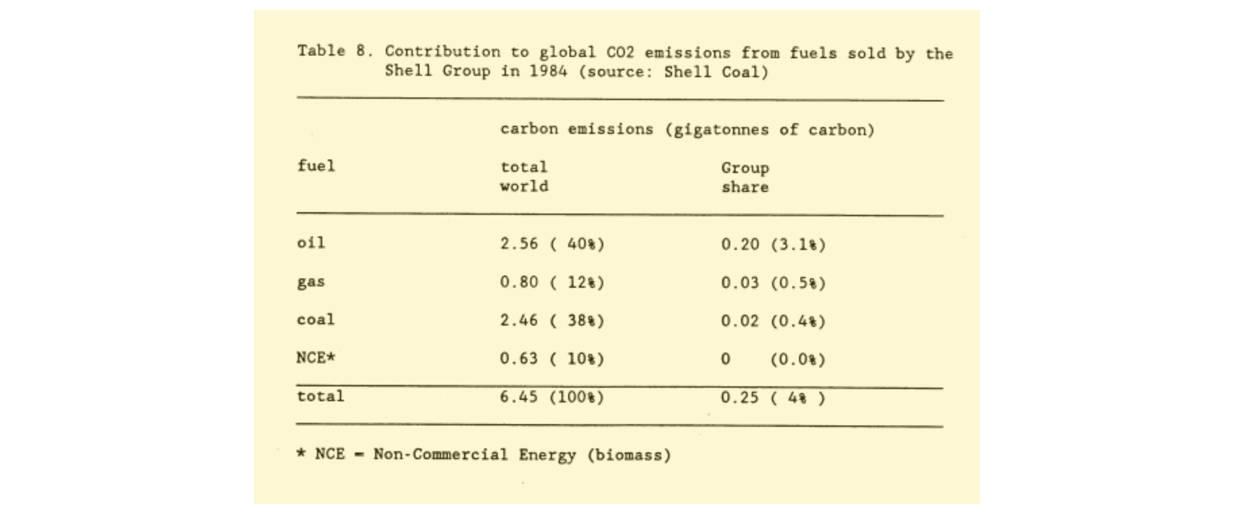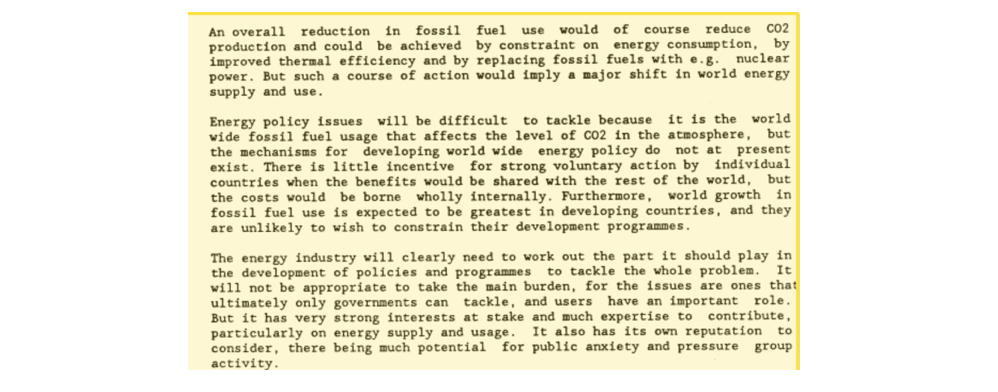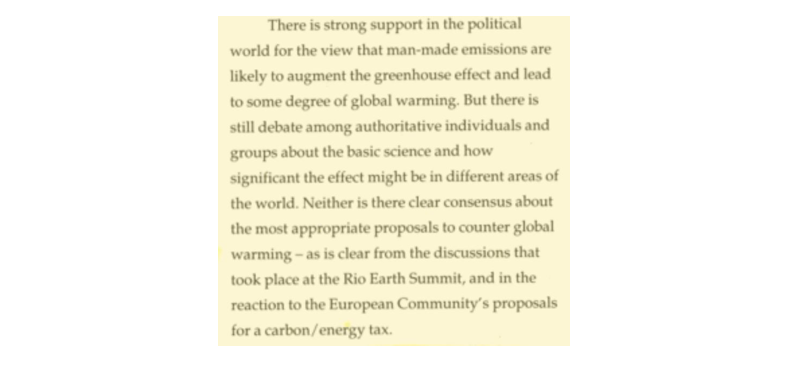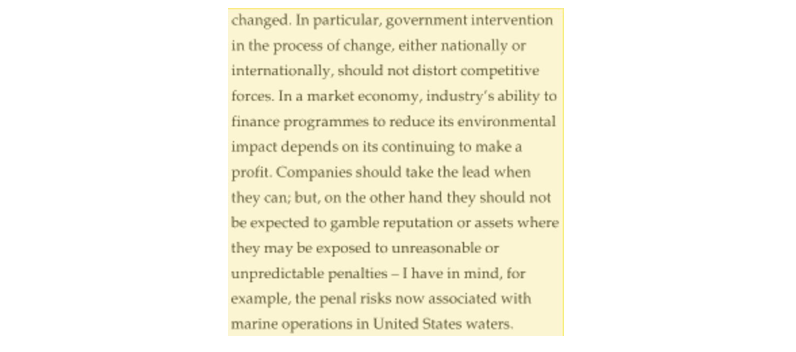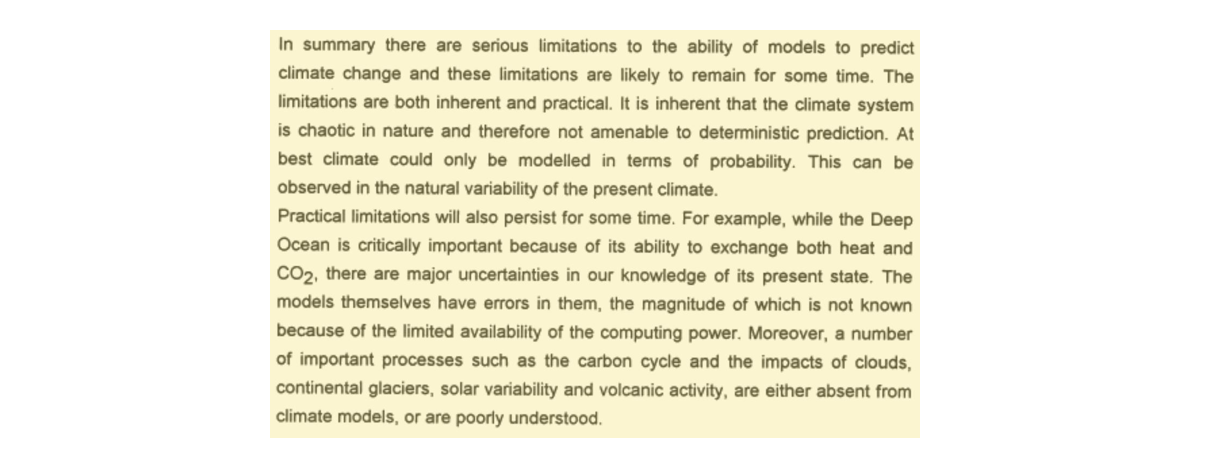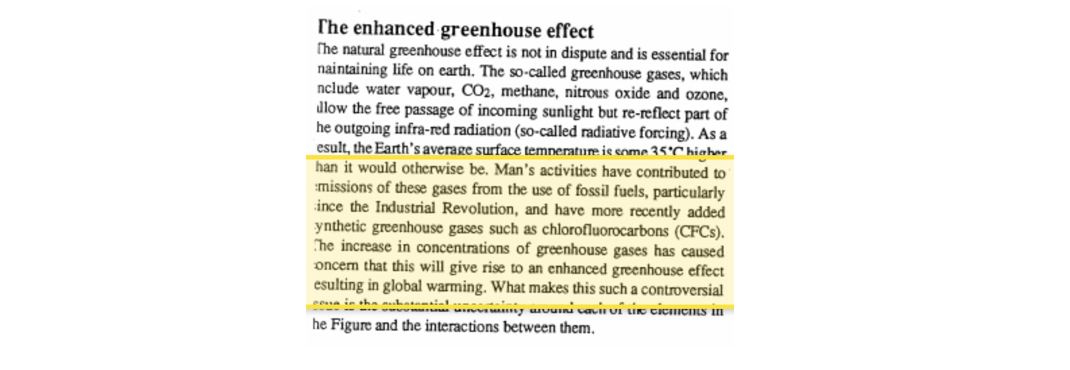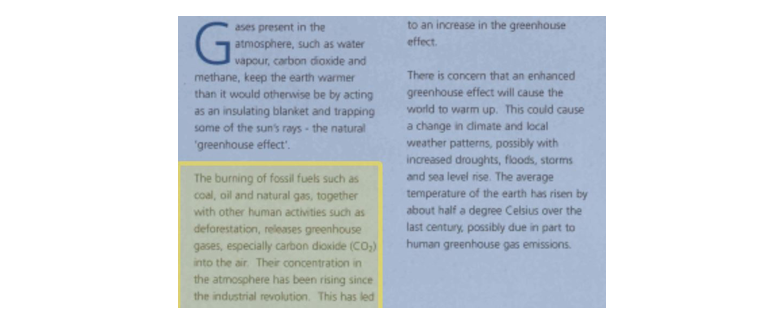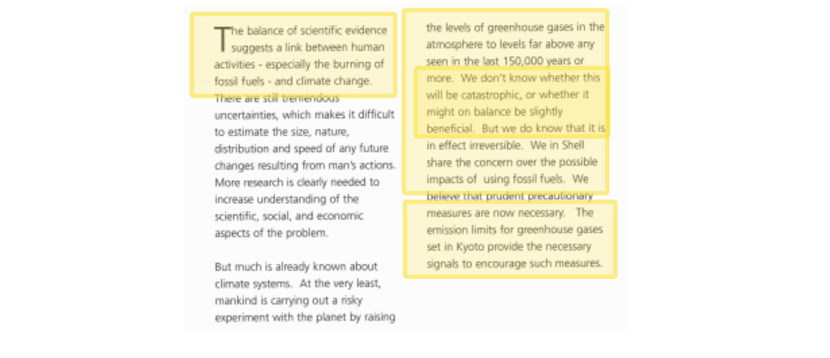There can be no mistake: as early as 1981, big oil company Shell was aware of the causes and dangers of climate change.
These documents show Shell walking backwards. In the 1980s it was acknowledging anthropogenic global warming. Then, as the scientific consensus became more and more clear, it started introducing doubt and giving weight to a “significant minority” of “alternative viewpoints” as the full implications for the company’s business model became clear.
By trawling through a tranche of documents first uncovered by Jelmer Mommers of De Correspondent, published on Climate Files, DeSmog UK can chart 30 years of the company’s understanding of climate science.
Shell commissioned a study about the greenhouse effect in 1981 by the Climate Research Unit and Dr T.G Wigley, which was published by the US Department of Environment in 1984. Then in 1988 the confidential report “The Greenhouse Effect” is prepared for the Shell Environmental Conservation Committee. From other source documents we can then follow as senior figures and publications veer between defence of climate science denial positions, faith in technological solutions and “efficiency”, the belief that countries should just adapt to a changing world, and questioning the validity of the scientific process.
As early as 1981 it was able to say unequivocally: “the total emission of 5.3 GtC 44 percent came from oil, 38 percent from coal and 17 percent from gas.” By 1988 it was stating clearly: “the main cause of increasing Carbon Dioxide (C02) concentrations is considered to be fossil fuel burning.” But come the mid-90s, the company starts talking about a “significant minority” of “distinguished scientists” that cast aspersions of the seriousness of climate change.
As Shell’s position on climate science evolves over time, the contradiction of simultaneously being involved with groups that fund climate denial becomes apparent. The following charts Shell’s knowledge of and public statements on climate change from 1981 to 2002.
1981
Shell knew the impact its products had on climate change decades ago, as we can see from this statement, referenced in a 1988 report:
Appendix 8 from this report says Wigley had “his feet on the ground” by stressing the uncertainties, but that he was willing to “stick his neck out and say there had been global warming over the last 100 years, that the 0.5 degrees increase is a result of C02 build-up, that we will see a further 1 to 2 degrees warming over the next 40 years…” and much more:
1983
The talk is now of whether there will be “significant global warming” and that if it will occur at all is “still a matter of debate”:
1984
Coal is identified as worse for emissions than gas. A switch from coal is proposed as solution to tackle climate change:
The reports even have a handy table showing the contribution to global carbon dioxide emissions from fuels, sold by the Shell Group in 1984 (as reported in the Shell report from 1988):
The company recognises that reducing CO2 means moving away from fossil fuels and the company’s own products. The company explicitly believes in the correlation between fossil fuel and economic growth.
“It is the worldwide fossil fuel usage that affects the level of CO2 in the atmosphere”
“An overall reduction in fossil fuel use would of course reduce CO2 production and could be achieved by constraint on energy consumption, by improved thermal efficiency and by replacing fossil fuels with eg nuclear power. But such a course of action would imply a major shift in world energy supply and use.”
“Furthermore, world growth in fossil fuel use is expected to be greatest in developing countries, and they are unlikely to wish to constrain their development programmes”
1988
In a confidential 1988 document “The Greenhouse Effect”, the company writes:
“There is reasonable scientific agreement that increased levels of greenhouse gases would cause a global warming” and that, “such relatively fast and dramatic changes would impact on the human environment, future living standards and food supplies and could have major social, economic and political consequences.”
It also says that: “By the time the global warming becomes detectable it could be too late to take effective countermeasures to reduce the effects or even stabilise the situation.”
1992
In a change of gear, Lodewijk (Lo) van Wachem said there was “still debate about the basic science” around global warming. Van Wachem became director of Shell Oil company in 1979 and chairman of the board in 1982 and so is likely to have seen the 1988 document about the greenhouse gas effect.
Shell clearly don’t want to take the responsibility, despite knowing that its products are harmful:
“Companies should take the lead when they can, but on the other hand, they should not be expected to gamble reputation and assets where they may be exposed to unreasonable or unpredictable penalties.”
Now the idea of clean coal appears. “A number of clean coal technologies are now also available” and “Other more advanced technologies may enable us to use more cleanly the world’s vast reserves of coal” – this despite the 1988 report which stressed that coal was worse than oil.
1994
Now we begin to see — despite earlier clarity and the articulation that environmental concerns were of “by far the greatest significance for the fossil fuel industry” — Shell now introduces doubt and talk of a “significant minority” and “distinguished scientists”:
The narrative as we enter the 1990s becomes more confused. As the scientific evidence becomes clearer and more defined, Shell’s anlaysis and messaging stresses difference and disagreement. Here’s an example:
At first we hear:
but then …
Shell, despite being forced to acknowledge the mounting global consensus, is still wrapped up in a climate science denialist narrative that “there is no convincing statistically significant evidence”:
Again, Shell reverts to claiming that “there are serious limitations to the ability of models to predict climate change”…
Shell’s conclusions concerning the science of climate change can be summarised as “uncertainty applies both ways”:
This pattern continues. Shell acknowledges the veracity of climate science but casts doubt and stresses that it is “not possible to dismiss the global warming hypothesis as scientifically unsound” but rather wants policy to admit “weakness”:
For Shell, uncertainty means action “could be premature, divert resources from more pressing needs [development and profit] and further distort markets [protecting the oil industry].”
1995
By 1995 it is forced to acknowledge the global scale and significance of the crisis:
“The possibility of climate change brought about by global warming via man-made increases in gases such as carbon dioxide (CO2) and methane – the enhanced greenhouse effect – is probably the most prominent global environmental issue of today and could have major business implications for the fossil fuel industry.”
Despite such ‘uncertaintly, the company does recognise human influence on the climate:
“Man’s activities have contributed to emissions of these gases from the use of fossil fuels, particularly since the Industrial Revolution, and have more recently added synthetic greenhouse gases such as chlorofluorocarbons (CFCs). The increase in concentrations of greenhouse gases has caused concern that this will give rise to an enhanced greenhouse effect resulting in global warming.”
This pattern of accept/retreat is now being continually played-out. Again, the use of the term ‘significant minority” is used to boost a denialist position. No explanation is given as to why this minority is “significant”.
“Furthermore, there are a significant minority outside IPCC who take a contrary view, believing the concerns over global warming to be exaggerated and misguided”, the report says.
1998
By 1998, Shell’s line is essentially to focus on the uncertainty around the impacts of climate change, depsite two decades of internal reports outlining how serious climate change is likely to be. There is still persistent quoting of climate science deniers.
The business model is not to be changed because oil and gas is expected to continue to be the main source of fuels for decades to come, the 1998 report implies. The language still talks in terms of “concern” rather than urgency:
“There is concern that an enhanced greenhouse effect will cause the world to warm up. This could cause a change in climate and local weather patterns, possibly with increased droughts, floods, storms and sea level rise. The average temperature of the earth has risen by about had a degree Celsius over the last century, possibly due in part to human greenhouse gas emissions.”
Despite such fence-sitting over the science, the company knows action is necessary:
“We in Shell share the concern over the possible impacts of using fossil fuels. We believe that prudent precautionary measures are now necessary.”
Which makes Shell’s continued huge investments in fossil fuels for the next two decades all the more intriguing.
Image credit: Shell report
Subscribe to our newsletter
Stay up to date with DeSmog news and alerts


